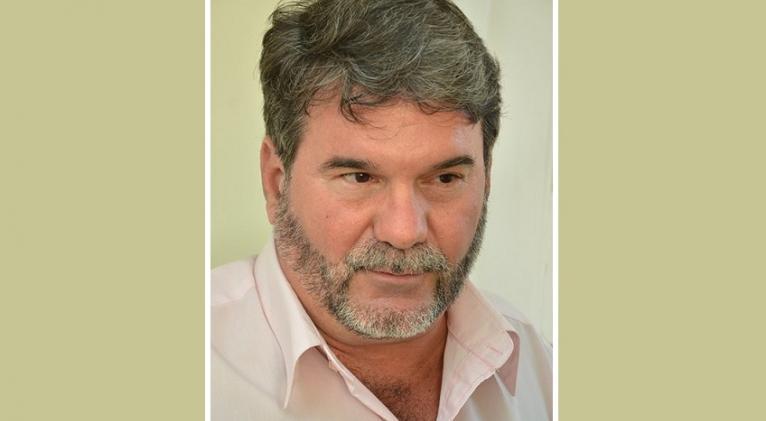The Dreamt Library for Omar Valiño
especiales

The Cuban critic, essayist, editor, and professor Omar Valiño Cedré (Santa Clara, 1968) assumed the direction of José Martí National Library of Cuba in December 2019. This year marks two important anniversaries: the 120th anniversary of the founding of that library and the 60th anniversary of the famous Words to Intellectuals that Fidel delivered at its headquarters. We talked about the current challenges of this emblematic institution, its projections and its role in the artistic and literary panorama of the nation.
- Beyond its role in the preservation of a specific heritage, how does the José Martí National Library position itself as a cultural center, as a center for the spreading of culture?
"In two main paths." The first thing would be to make clear about what to do with knowledge, which is not simply "keep it". It should be appreciated. Spread it. Disseminate what each library has. Orient the reader. Facilitate access to that knowledge. This appreciation has several levels. Researchers know that. A library is by excellence the space dreamed of "getting lost". Remember that passage in Borges where he imagined paradise as a library. Then spreading what’s inside a library, and making it culture in the social imaginary, is one of the great labors.
The other is that the library is a magnificent "roof" to accommodate as many cultural actions as you like, and not just culture in its artistic and literary terms. The library (and luckily it has since its installation in this building, which was built to house it, with spaces for artistic and cultural realization: gallery, theater, multipurpose rooms) has a permanent purpose of cultural projection: literature, science, music, visual arts…
—And we should add to that the symbolic value of this library, the scene of so many milestones of the national culture ...
—This library (and I am now referring to the installation of the National Library in this building, which involves approximately half the path of its existence), with the arrival of the Revolution and the initial female leaderships, was opened to the people, to users who had never set foot in an institution like this. Not just offering the usual services, but also to develop an extraordinary work of cultural extension. During the 60’s the library became an obligatory transit point for practically every great figure of culture, in any of its manifestations, who passed through Cuba.
In cultural processes, some institutions become, more than others, irradiation centers by excellence. This Library was one of those centers in the early years of the Revolution. Times have changed, but I think the Library has to recover part of that action.
This year the underlining is very clear, since it reaches 60th years Fidel Castro's Words to Intellectuals, which were delivered here. There were three days of meeting with writers and artists that ended up in that speech. That event gave great symbolism to the role of José Martí National Library, since that intervention somehow outlined the cultural policy of the Revolution.
But there’s something that I always like to highlight when talking about the 120 years of the Library: there’s a particular richness here, a heritage that defines us as Cubans. Few places have that privilege. There’s a gathering of knowledge, creation, complexity, density... that speaks deeply of our identity, and not of our clichés. That is the value of that long process of treasuring, which never ends. What’s preserved from past centuries is as valuable as what is added every day.
That is to keep the same Borges’s images, the powerful aleph that vibrates in José Martí National Library.
- To what extent does the new context impose a renewal of the ways of running a library?
"It’s a particularly complex task." How to feel and convey the feelings, visions and criteria of so many valuable people in Cuba about the future of the Library and its challenges for the new times? And what to do, without being crazy, avoid mistakes, we can hold a dialogue that’s more practical between those permanent objectives of the Library and what is necessary to respond to the spirit of this age? It’s necessary to renew the role of the library for current times, so that children and young people have once again in their eye the huge value of an institution like this, which is something that to some extent has been lost or has lost importance if we compare it with that of other times.
It’s a complex equation, because you have to add the demands and possibilities. It’s necessary to identify the practices that have gone out of fashion, that will not return due to the imperatives of new times. But at the same time we cannot indulge in the idea that any malfunction is due to the conditions of these new times. Old functions of the library have to be projected onto new media, based on new ideas and new proposals, which may even seem daring.
—And how to solve that tension between knowing what you want or should do, and having the resources to do so?
—Always, as in any Cuban reality, you run into material obstacles, which here mean above all technology and materials, which tend to be very specific, very scarce and a good part of them are not produced in the country. Materials and supplies for restoration and conservation, for example; that is a very depressed activity in this Library and in the entire public library system.
But anyway we have been working on solutions that these obstacles will not prevent. I will give you some examples:
The Eliseo Diego ward for children and young people, which will open in July, and will recover that natural entrance of children and adolescents to the world of the Library. It will be a room that will have the books of a lifetime, but it will also be equipped with new technologies. In other words, it will be a ward like a library should be. Many vocational guidance activities and artistic presentations can be held there.
We are rebuilding and providing new possibilities to the theater of the institution. There we are going to hold important commemorative sessions for the 60th anniversary of the speech Words to Intellectuals. This theater must also be a point of cultural reference for the communities around the Library.
And we are holding on - with great difficulty, we have to say - what we have called “the digital battle”. There is much to be done there. But we cannot stop because a renewal of the library's dialogue with its public is needed.
We are going to have the media library, with new conditions. People will be able to "access" huge repositories of cultural material, they can even copy them. And we are achieving better levels of access to the library's heritage from the catalogs of the digital portal, which purpose is to keep working so that these digital catalogs are closer to the coverage of physical catalogs. It’s the mirror I was talking about: people have to find the first door into the library there.
We are renewing the publishing world of the library, in both media: paper and electronic format. And we have many more plans, which of course collide with these material obstacles ... and sometimes with some mental obstacles too. Anyway, it’s necessary to plan an immediate library, a mediate and a future one.
- At what stage is the process of digitization of materials?
"It’s a work in progress." That is its main virtue. It’s now focused on digitizing serial books. It’s one of the main tasks of the National Program for Historical Memory. Many of those physical materials are seriously damaged. There’s a lot of material accumulated, and in a sense saved. Digitization saves. It’s not just the chance of distributing and multiplying that information. The great challenge is to put that heritage on the net. Now it’s available here, but the goal is for it to be on the internet, so that it can be consulted for free and easily from anywhere in Cuba and the world.
"To what extent does the library you run now resemble your dreamt library?"
- Someone recently asked me, in a less lyrical way, what should improve the work of this library. Of this and all the libraries in the country. And I answered with one word: everything. Everything must improve. But I don't want it to sound like a demagogic statement. To meet the tasks assigned to us, we must do and at the same time think how to do it. Without a series of concepts put into practice we won’t make it.
I remember with great satisfaction the National Library of which I was a user. We are talking about more than three decades ago. It was that library that closed at eleven in the evening. But that time is not like this. The virtual age has changed us. We are facing a change almost from a civilizing model. It’s necessary to think about how the library can gain knowledge value in the collective imagination. I felt that, unlike other cultural institutions, the library had lost some visibility. People have to know what it is, where it is and what role a library plays. And how to use it, in the best meaning of the word. We are working on that. Between the pretense of a future and the nostalgic and often ideal dream. Just to avoid any misunderstanding in the answer: I can say I’m standing in this library still away from the library I dreamt.
Translated by Amilkal Labañino Valdés / Cubasí Translation Staff














Add new comment